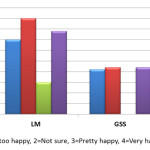By Mystic Life
The reason most traditional relationships end is due to one (or more) of what I'll refer to as “The Three D's”: Drifting, Dysfunction and Desire.
 Drifting occurs when two people evolve in different directions, and no longer feel a common bond that they once shared. Of course, a certain degree of variation in interests and values is typical, but when members of a relationship have significantly “drifted apart” they often decide to end their relationship since it no longer feels compatible.
Drifting occurs when two people evolve in different directions, and no longer feel a common bond that they once shared. Of course, a certain degree of variation in interests and values is typical, but when members of a relationship have significantly “drifted apart” they often decide to end their relationship since it no longer feels compatible.
Dysfunction occurs typically in the forms of emotional, verbal or physical abuse. Although it can be hard for some people to admit that their relationship has become so unhealthy, the relationship must heal, end, or result in perpetual misery. When a dysfunctional relationship ends, few outside observers feel that there is a true “loss” so much as the opportunity for a new beginning.
Desire, the third “D”, is also a common cause for the end of many traditional relationships. Monogamous relationships end when someone gets caught (or admits) having an affair. In some cases, honest people choose to admit they have feelings for someone else before acting upon their attraction...but the outcome is the same. Another way in which desire ends relationships is when someone suppresses their resentment for the fact that having a partner “prevents” them from being with someone else, which can lead to subconscious sabotaging of the relationship in order to attain freedom. Additionally, someone who suppresses the positive energy that comes from having other attractions can experience a “deadness” they may not even understand, which can be a catalyst for the demise of their relationship.
As you can see, out of these three ways in which romance dies, desire is the most complex and varied dynamic. The reason that desire for another person is generally seen as “bad” is because it triggers a sociobiological response of jealousy, which is seen by virtually every mainstream culture on Earth as legitimately unacceptable. When a partner's feelings threaten your sense of security, and your society says you should leave them for it...that will be what most people tend to choose. This is where polyamory comes in.
The primary way in which polyamory represents a paradigm shift in how we think about love is that although polys can understand drifting and dysfunction leading to the end of a relationship, desire for others no longer needs to be a deal breaker. By eliminating your partner being with someone else as a reason for no longer loving him or her, you will create a more sustainable relationship.
So if it leads to more solid relationships, why don't more people choose polyamory? Because letting go of the impulse to control another's feelings (so that you experience more security) is generally not viewed as a viable option. We are socialized to believe that it is more justified to attempt to shame another person into a state where they suppress their feelings, which often leads to cheating. Many monogamous relationships involve some form of cheating in an attempt to experience freedom and diversity, while not allowing one's partner the same options. Of course, this attempted “solution” to jealousy results in a lack of integrity, and (in my opinion, and experience) results in bad karma by taking away a partner's ability to choose whether or not they would stay in a relationship if they knew the truth.
This has resulted in a world where many monogamous people are much more well known by their friends than their partner. Their friends often get to hear about all of their feelings, including attraction to other people, while their partner gets a filtered, non-threatening version of who they are. This is not to say that there are no human beings who honestly feel romantically attracted to only one person. It is to say that there are millions, if not billions, of people who experience a tremendous amount of inner conflict regarding monogamy.
On the poly path, we receive what we are able to give. By contrast, if you could have as many partners as you wanted, and your partners could only be with you...your ego would be most pleased. If we could kiss, cuddle and make love with whomever we cared for while not feeling threatened by our lovers having feelings for anyone else, it might make us feel safe, but it would smother our personal growth. Therefore, the only way to experience the freedom that allows our relationships to not be based in suppression and resentment, is to learn to let go of control. There are many people on the spiritual and/or personal growth path who allow monogamy to be the one facet of their life in which they believe they should still be allowed “attachment.” It doesn't work. Attachment to anything or anyone still leads to suffering. There are no loopholes.
Scarcity thinking is at the core of jealousy. When we fear that our partner loving another will lead to not enough love for us, there are two ways that we can replace our impulse to tantrum with self growth:
(1.) We can work on deepening our self love. Unless we get to a place where we truly, lovingly embrace who we are, our sense of self will always be at the mercy of the choices of others. Many people have gone their whole life without self love. Its importance is not just a cliché. Self love is crucial, and requires core psychological work which can lead to liberation. If you haven't attained self love, polyamory will only multiply your suffering by increasing your attachments.
(2.) In addition to deepening love for yourself, you can open your heart to new partners. If your current partner has feelings for another, one trick that your ego might play is the idea that “s/he is the only one for me, and nobody else could ever be so compatible, so since s/he's not going to be as available, my life will be forever horrible.” If we convince ourselves that there are too few polyamorous people out there, or that we can only have one soulmate, we will create unnecessary suffering when our partner falls in love with another person. However, it is helpful to keep in mind that life never gives us more than we can handle. Therefore, if you feel that the only way to cope with your partner loving another is to run away, attempt to surrender to what is unfolding, and open your heart.
It may seem easier to leave a partner who loves another...but is it really? Anger, judgment, and societally reinforced self-righteousness provide little comfort if you are throwing away a connection that satisfies you on many levels. If you and your partner have not drifted apart, and your relationship is not dysfunctional, polyamory offers a philosophy of love that doesn't require desire for another to necessitate parting ways.








Excellent post! I’ve been open to polyamory for a while now, but the fear of family/friend backlash has kept me from pursuing it seriously. I don’t think my husband or I are really ready to really pursue it; we are happy as we are, for now.
Mórrígan, I’m glad you liked it. That’s great that you and your husband are happy as you are. Best to not rush into polyamory until it feels well-timed and you’re ready to let go of attachment to the opinions of family/friends.
My long time bf has brought this up in the past and has now just gotten to a serious point. He has found someone he thinks we will be compatible with. I am not sure I am secure enough to move forward. I really like her but I find myself getting very jealous. I don’t want to ruin my current relationship by not moving forward either. I also have concerns about letting close friends and family know.
Hi Erika,
Thanks for sharing about your situation. It sounds like you’re in a period of doing some deep reflecting about whether or not being polyamorous is right for you. Listen to your inner guidance and I’m sure you’ll find an answer. In case it’s helpful, I wanted to share my perspective that if it’s not something you’re ready for, choosing to be poly from a place of fear (such as a fear of losing your bf) will probably not create a solid foundation. If it comes from a place of love, and truly feels right in your heart, then you can commit to working on overcoming feelings of jealousy (which are of course, understandable). Regardless, the truth awaits within you. The mind can come up with a “reason” for anything, but the wisdom of your body is in your feelings.
Thank you so much about the info of being poly. My bf for 9mo & I talked to one of my bestfriends that I knew he had a strong attraction to me & I to him. My bf is ok with it. As a matter of fact he was happy. We used to beat ourselves up mentally because we didnt know about polyamory until my bestfriend told us about it now weare much happier with ourselves aswell as eachother
I got ‘busted’ a few months ago on FB because my girlfriend lists herself as married – and happily so. My family hasn’t been so accepting, so I can really identify with your previous response, Mystic, of “Best to not rush into polyamory until it feels well-timed and you’re ready to let go of attachment to the opinions of family/friends.”
I feel sorry for my brother and sister-in-law that they feel the need to cut me out of their lives, and their children’s lives, because of how I choose to live mine. My parents are very slowly coming around, and my girlfriend’s husband’s advice has really helped, which was “Don’t ask anyone’s permission to date more than one person, just say you’re doing it and try to make it sound as normal as possible.”
Good luck to those not yet out as poly. 🙂
Very good post. I feel this is true in every sense of my being. I have never been able to express into words what my thoughts are but you have done that for me exactly. I would love to be in a relationship of unconditional love. I have so much to give of that to anyone and I know I would be very happy to share it, man or woman. Thank you for this.
Hi Brandi. You’re welcome for the info…I’m glad you found it useful. Thanks for sharing your story. It sounds as though your bf is very secure with himself since he’s comfortable with you expanding upon your love. Congratulations and continued well wishes 🙂
Aaron, I’m glad you found my prior comment helpful. I appreciate you sharing about your situation and am sorry to hear you’ve run into some judgment with your choices. It’s ironic that a choice that comes from a place of love can be met with such negativity, but many people are threatened by what they don’t understand. Until they can accept your truth, they can’t offer very much on your path of growth, so stick to your true path and love yourself enough to be authentic.
Liana, you’re welcome. I’m glad the words I wrote resonate so strongly for you. It sounds like you are passionate about your draw towards unconditional love, and that polyamory is your natural way of loving others 🙂
“There are many people on the spiritual and/or personal growth path who allow
Hi Mystic Life,
monogamy to be the one facet of their life in which they believe they should still be allowed “attachment.” It doesn’t work. Attachment to anything or anyone still leads to suffering. There are no loopholes.”
So what I want to know is, if we have no attachments and have self love, why would we seek sex, isn’t that an attachment and desire. I would imagine that being in the state of non attachment and self love, the desire would not exist to have multiple partners, we would be satisfied with what we have. It would be a peace of mind, we would be enraptured in that state.
Michael, without attachment you can experience things of this world without needing them. You can eat without making food an addiction. You can have sex without compulsive neediness. Non-attachment is not removing ourselves from the experiences of this world, but removing ourselves from needing them to feel at peace. Sex doesn’t only occur from a place of seeking it to fill a void. It also arises from feelings of love and closeness. Polyamory is allowing one’s self to love more than one. Non-attachment as a spiritual practice is the ongoing commitment to be at peace regardless of whether one has zero, 1, 2 or more partners at any point in time.
I wish I could respond to this post with my real name. I have been in a poly relationship for about a year now. I’m set to marry my long-term boyfriend soon and hope, in years to come, a commitment ceremony is something I can share with the newer boyfriend in my life.
Often I feel very alone and I feel as though the three of us are wading through a minefield. Who to tell, who not to, who to try and act vague in front of… At some point, I will be using this article when we invariably come out to family who won’t understand. I want to thank you for your frankness because it puts into words things I often can’t.
I wonder, are there support forums with (relative) anonymity out there? I’d like to be able to talk with you or folks like you through more than the means of a comment.
It’s so nice to not feel alone. Well, not too alone as I’m blessed to have two who love me so very much.
Hi Kitty,
I’m glad you found my article useful. Yes, it can feel lonely to be on an alternative path, but as awareness grows, there will be many others who choose polyamory.
You can look for support groups by searching for “polyamory” at Yahoo Groups & Meetup.com. You can also use the forums at Polymatchmaker.com
You may contact me directly via my site http://SpiritualPolyamory.com
Peace,
Chris (pen name, Mystic Life)
mono life is sooo much better than poly..why would anyone join poly which does not even looks like a true form of love!!!
Thank you for this article. I have found it most helpful to reflect on opening and letting go, especially of the need for security. This itself requires deep psychological work as the lack of security growing up creates adults like me who are hypervigilant and try to control their surroundings. In this letting go, I am able to hear others’ needs instead of, in my triggered state, shaming them.
My boyfriend and I have been in conversations about monogamy vs. polyamory since we started dating. My issues of jealousy and need for security mean that I need to do more personal work, and his fear of commitment and fear of not being good enough for me also need to be worked on, as, like you said, fear is a terrible foundation for polyamory. I appreciate how you’ve explained these ideas. I think it’s also helpful for me to reflect that polyamory is not for everyone, and that there can be ethical and responsible behavior in monogamy, too.
Hi Samantha,
Thank you for your feedback and taking the time to share your thoughts and feelings. It sounds like you’re aware of yourself and your process.
Peace,
Chris (pen name, Mystic Life)
http://www.SpiritualPolyamory.com